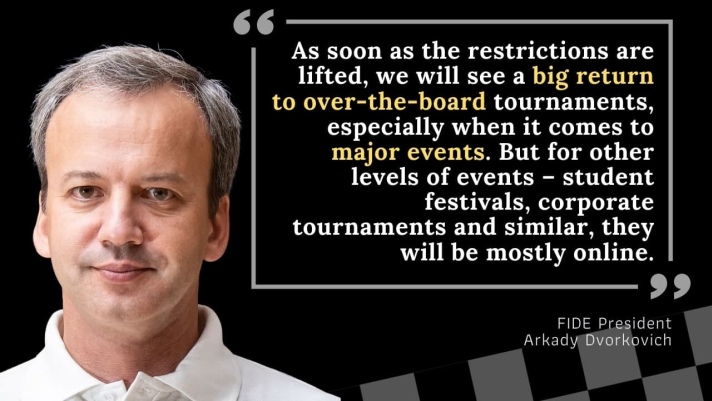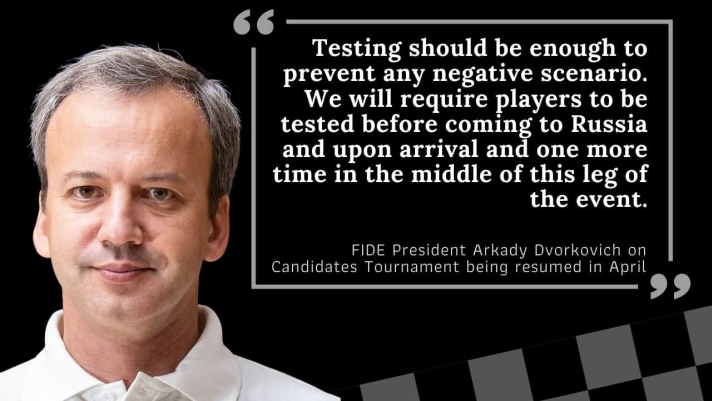The March issue of British Chess Magazine includes an interview with the FIDE President Arkady Dvorkovich, by its Editor Milan Dinic. Courtesy of British Chess Magazine, we offer you an advance and some excerpts from this interview.
BCM: What do you think will be the long-lasting effect of coronavirus on chess, if any?
Arkady Dvorkovich: Hopefully, we’re not going to have any long-lasting effect of the coronavirus on chess. We are hopeful that strict lockdown measures won’t be around for much longer, as the vaccination will improve the situation globally. Also, people will be more prepared for a repeat of the pandemic.
However, it would be naïve to say that we’re not going to see the long-lasting effects in terms of the share of online chess. There will also probably be a more cautious attitude towards mass tournaments, in terms of precautionary health measures.
The biggest thing is online chess. It provides better access to millions of people, it provides access to training, watching and playing chess, which is crucially important for growing the chess audience. Also, it’s fun to connect to people all over the world without the need to spend money on traveling.
For the lovers of mass chess events, coronavirus will have a big consequence.
But online is in no way a substitute for over-the-board chess, that’s the point I’d like to stress.
One of the important things now is how to structure the chess calendar for professional players and how to make sure that OTB and online chess go well together.
BCM: As a consequence of covid-19, do you see chess changing in a way so most events will be played online?
A.D: As soon as the restrictions are lifted we will see a big return to OTB tournaments, especially when it comes to major events. But for other levels of events – student festivals, corporate tournaments and similar, they will be mostly online. OTB will come back but it doesn’t mean that online will go away. I estimate the ratio between the two to be 70-30 in favour of OTB. That’s why it’s important to think of the harmony of OTB and online events at the top level.

BCM: From the organisational perspective, what are the key differences between online and over-the-board events and which are more difficult to organise?
A.D: You have different challenges for both. For the OTB events, you have logistical issues – the venue, travel, accommodation, safety and similar. For online, the key challenges in the field of anti-cheating and the stability of the internet connection.
BCM: Chess has for years been struggling to get sponsorship. Has the growth in chess interest during the pandemic helped bring more sponsors in?
A.D: I would say it’s a combination of two trends now. First, we are trying to work professionally in the area of marketing. We have invested in getting more people to do marketing, to get companies connected. On the other hand, we are working much more in analysing the data we have – on the number of active players, on children participating in ‘Chess in schools’ programmes and similar – so we’re able to present a clearer picture to sponsors.
There is also a very positive atmosphere in the chess world. We have good commercial stories from the Play Magnus Group. Also, online platforms – from chess.com to Twitch and others, have helped raise the interest in as well as the profile of the game. Streaming is now another booming thing – Twitch had record numbers in February. So, on one hand, we have much more effective and organised work on the side of FIDE, and strong market trends in favour of chess.
Also, the Queen’s Gambit has had an impact, at least a temporary one. We’re trying to use this factor for promotion. The series was a really important moment for chess. It was not the first movie/series about chess, but it was done in a much more commercially attractive way and both chess-wise. And Netflix did a great job, both for themselves and for us.
I’d also like to note the booming chess trends in India. This announcement of the World Chess League by Mahindra is a thing to follow.
We have interest from China to do more. There are initiatives from the US – with Rex Sinquefield taking the lead. Uzbekistan has now introduced a huge chess development programme. Israel has increased its Chess in schools programme. Nice things are happening for chess.
Just yesterday I was present at the closing ceremony of the African chess championship – there were 2300 players. That’s big. So, again, online chess helps and will help. But the key is to have more partners and sponsors.
Recently I was in Serbia and I hope we will be able to do more events there.
BCM: If I got you correctly, you see online chess as the driving force which will get more people attractive and more sponsors for over-the-board events as well, rather than it being the other way around.
A.D: Yes, that is correct.
BCM: Last year, the Yekaterinburg Candidates tournament had to be cut short due to the pandemic. Now you plan to continue it in April. How will you ensure the safety of the participants? Will there be spectators?
A.D: There is never a 100% guarantee, that’s for sure. But, I think both we and the whole world now learnt how to deal with such events. It is one of the most important global events but it includes a couple of dozen people involved. Testing should be enough to prevent any negative scenario. We will require players to be tested before coming to Russia and upon arrival and one more time in the middle of this leg of the event.
In terms of whether the spectators will be allowed, we are going to announce that just before the tournament. We will make the decision based on the situation in Russia at the moment, and in Yekaterinburg in particular. We will make the decisions based on data on the ground, not some abstract models.

BCM: Will the players have to self-isolate upon arrival?
A.D: No. Only for a few hours until the results of the tests come in, not days or weeks.
BCM: Will the players and the teams be offered the Russian Sputnik Five vaccine, should they want to?
A.D: We are completely opened to that. However, to do that, they should come earlier so they can receive both doses. I know that one of the players already took another vaccine, and I know that one of the players took the first dose of the Sputnik vaccine.
I am sure that most of them want to be vaccinated. If they want Sputnik, we will find a way to arrange it. They certainly have an option.
BCM: There are new strains of coronavirus appearing – the UK strain, South African, Brazilian and others are expected. If the world starts again to go head towards lockdowns and countries closing, will that mean that the match for the title of World Champion will have to be postponed again?
A.D: We are now concentrating on the Candidates and for us that is crucial. If we’re able to do this on time, in April, I don’t see a real risk for the match for the title of World Champion taking place at the end of the year. The match requires the involvement of even fewer people. Of course, if for some reason the Dubai expo is postponed again, we will have some changes of course. Hopefully, that won’t happen. But even in the unlikely scenario that the Dubai Expo is cancelled, we can still have the match in Dubai.
BCM: Whilst you are at the head of FIDE, will you ever consider having the match for the title of World Champion played online? Thinking about the future of chess, do you see major competitions such as the candidates or matches for the title of world champion being played fully online one day?
A.D: I don’t see any reason to do that. We can have some different festivals online, but not world championships.
BCM: One of the questions raised about online events is the problem of cheating. How confident are you that FIDE will be able to prevent players from cheating in top online events?
A.D: We already have algorithms that give you a reasonable degree of certainty that there is cheating. We are confident that we can improve that with the help of AI companies.







